Three Critical Reflections All Mentors Should Consider
- Read original article here

placeholderIt's fair to say that 2020 has been a year of reexamination. Personallplaceholdery, recent global events have led me to reexamine a number of my identities.
First, there was the identity of a world traveler in the time of a pandemic. Next, the death of George Floyd and the protests that followed prompted me to do a lot of thinking about my identity as a white man in this world. I then discovered a study that prompted me to reexamine a third identity, my role as a member of the Entrepreneurial Industry (EI).
The Entrepreneurial Industry, as defined by Richard Hunt and Kip Kiefer in their 2017 article is a $13 billion collection of goods and services that purportedly help entrepreneurs start companies. This includes conferences, books, seminars and tools. But Hunt and Kiefer found that the more resources from the EI an entrepreneur consumes, the more likely that entrepreneur is to fail.
As someone who sits on a lot of panels, writes a regular column, and advises a lot of entrepreneurs, it never occurred to me that the advice I'm giving could potentially be harmful.
And so, I have developed a set of personal ethics for my mentoring and writing. My goal is to maximize the odds that I do good in the entrepreneurial world and minimize the chances I do harm. I share this with you in the hopes that it will help you examine your role when sharing advice.
For most of us that speak on panels, this feeling will be familiar. The moderator asks a question, I don't really know much about it, but I decide to ramble extemporaneously anyway. I hope I sound smart, or at least that I close my mouth before I say something stupid, but I never respond by acknowledging my ignorance.
The thing about it is, the audience doesn't really know my confidence level in my response. As long as I'm speaking with my typical enthusiastic and authoritative tone, how are they to know that I'm making it up as I go along?
From now on, if someone asks me to pretend to be an expert about something that I am not an expert on, I'm going to decline the question.
As mentors, the more pithy our statement, the more likely it is people will embrace it and share it. Unfortunately, avoiding nuance can cause more harm than good. One of my favorite examples is "do more faster"-- a mantra of entrepreneurs that makes a lot of sense until it doesn't. There are times when an entrepreneur needs to slow down, think, and allow for introspection instead of covering up the uncertainty with constant action.
From now on, if I think there are useful caveats to the advice I give, I'll make sure to articulate those even at the risk of making my advice less quotable.
Entrepreneurial advice givers love to deride "lifestyle businesses" and tell endless stories of the entrepreneurs that risked it all. Thanks to the selection bias in the stories we tell, those stories of risk typically end with successful outcomes.
As a result, mentors constantly pass along the notion that volatility and risk are good things, rather than podangerous to the business and the entrepreneur. The dynamic is made worse by the fact that volatility is probably good for the investors who have a portfolio to hedge risk. It's easy for them to tell entrepreneurs to swing for the fences and risk it all.
From now on, I'll make sure to clearly articulate the risks of any advice that increases entrepreneurial volatility, and make my audiences aware of the selection bias inherent in where their advice is coming from.
I still think I have a lot to learn from other entrepreneurs, and I believe I still have opportunities to teach and try to help others learn from my mistakes. But, among the various ways I am reexamining my life to try to live more intentionally, I'm going to work on making sure I am a responsible member of the Entrepreneurship Industry. I'd urge everyone else to consider a similar process of self-examination to make sure that the advice we give has the effect we intend.
Images Powered by 

